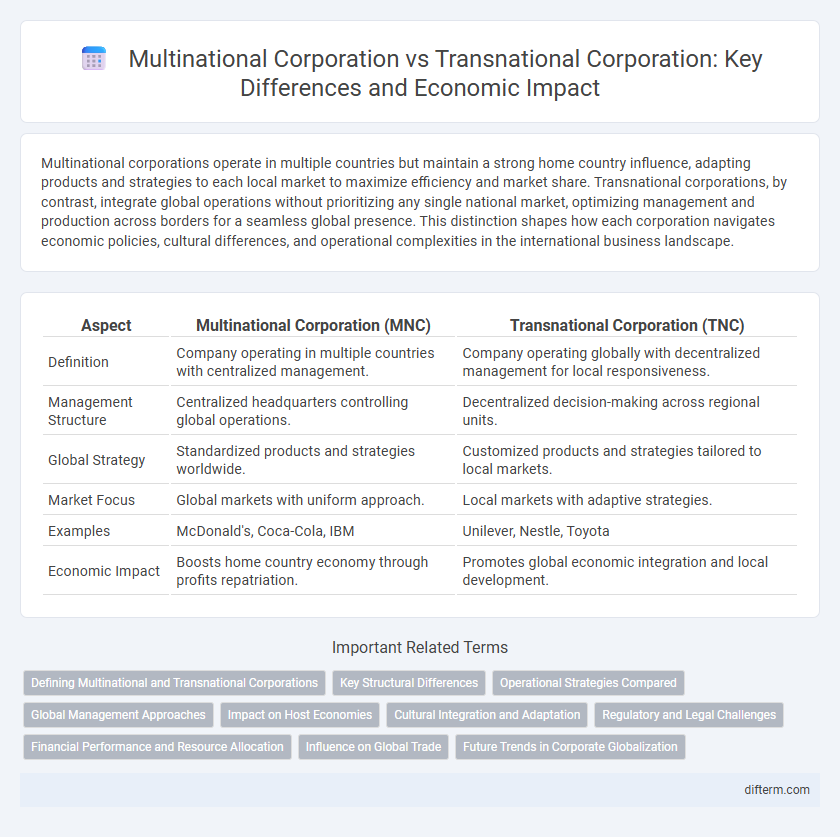Multinational corporations operate in multiple countries but maintain a strong home country influence, adapting products and strategies to each local market to maximize efficiency and market share. Transnational corporations, by contrast, integrate global operations without prioritizing any single national market, optimizing management and production across borders for a seamless global presence. This distinction shapes how each corporation navigates economic policies, cultural differences, and operational complexities in the international business landscape.
Table of Comparison
| Aspect | Multinational Corporation (MNC) | Transnational Corporation (TNC) |
|---|---|---|
| Definition | Company operating in multiple countries with centralized management. | Company operating globally with decentralized management for local responsiveness. |
| Management Structure | Centralized headquarters controlling global operations. | Decentralized decision-making across regional units. |
| Global Strategy | Standardized products and strategies worldwide. | Customized products and strategies tailored to local markets. |
| Market Focus | Global markets with uniform approach. | Local markets with adaptive strategies. |
| Examples | McDonald's, Coca-Cola, IBM | Unilever, Nestle, Toyota |
| Economic Impact | Boosts home country economy through profits repatriation. | Promotes global economic integration and local development. |
Defining Multinational and Transnational Corporations
Multinational corporations (MNCs) operate in multiple countries with a centralized management structure in their home country, adapting products and marketing strategies to local markets. Transnational corporations (TNCs) integrate global operations without a fixed national headquarters, emphasizing a networked structure that leverages global efficiencies while addressing local responsiveness. MNCs focus on international expansion through subsidiaries, whereas TNCs blend global standardization and local adaptation through a more decentralized approach.
Key Structural Differences
Multinational corporations (MNCs) maintain centralized management with distinct subsidiaries operating in different countries under a parent company's control, emphasizing local responsiveness within a global framework. Transnational corporations (TNCs) feature a more integrated network structure, where decision-making is distributed across regional units to optimize both global efficiency and local adaptation. The key structural difference lies in MNCs' hierarchical model versus TNCs' flexible, decentralized approach promoting cross-border collaboration.
Operational Strategies Compared
Multinational corporations operate through decentralized strategies, adapting products and marketing to local markets to maximize regional responsiveness and competitive advantage. Transnational corporations implement integrated global strategies, balancing global efficiency and local responsiveness by coordinating operations across borders with shared resources and knowledge. This approach enables transnationals to optimize economies of scale while maintaining flexibility to cater to diverse markets.
Global Management Approaches
Multinational corporations operate with a decentralized management approach, adapting strategies and products to fit individual national markets while retaining some global control. Transnational corporations implement an integrated management structure that balances global efficiency with local responsiveness, leveraging worldwide resources and knowledge. This flexible global management framework enables transnationals to optimize innovation, cost, and market responsiveness simultaneously.
Impact on Host Economies
Multinational corporations (MNCs) impact host economies by creating jobs, transferring technology, and generating tax revenues, yet they may also exploit local resources and influence government policies to favor their interests. Transnational corporations (TNCs) often surpass MNCs in integrating operations globally, which can lead to more efficient resource allocation but may result in reduced local autonomy and increased profit repatriation. Both types of corporations significantly affect economic growth, labor markets, and environmental standards in host countries, with the balance of benefits and drawbacks varying by governance and economic context.
Cultural Integration and Adaptation
Multinational corporations (MNCs) tailor their strategies to fit the cultural norms of each country, promoting localized management and product adaptation to meet diverse consumer preferences. Transnational corporations (TNCs) integrate and coordinate global operations while fostering a unified corporate culture that transcends national boundaries, balancing global efficiency with local responsiveness. In cultural adaptation, MNCs emphasize respect for local customs, whereas TNCs implement cross-cultural integration mechanisms to leverage diverse perspectives for innovation.
Regulatory and Legal Challenges
Multinational corporations face regulatory challenges due to varying national laws and compliance requirements in each country they operate. Transnational corporations encounter complex legal risks by integrating and balancing diverse regulatory frameworks across borders to enhance operational efficiency. Navigating differing tax codes, labor laws, and environmental regulations remains critical for both entities to avoid legal penalties and ensure sustainable growth.
Financial Performance and Resource Allocation
Multinational corporations (MNCs) typically centralize financial performance metrics within home-country headquarters, leveraging localized strategies to optimize resource allocation in each market. Transnational corporations (TNCs) adopt a more integrated approach, distributing financial decision-making across global subsidiaries to enhance efficiency and responsiveness in resource deployment. The financial performance of TNCs often benefits from greater economies of scale and innovation driven by cross-border resource synergy compared to MNCs.
Influence on Global Trade
Multinational corporations (MNCs) influence global trade by establishing operations in multiple countries, optimizing supply chains, and adapting products to local markets, which enhances cross-border investment and trade volumes. Transnational corporations (TNCs) exert deeper influence by integrating global production networks without a strong home base, facilitating seamless resource allocation and innovation across countries, thereby driving globalization more intensively. The distinction in structural approach between MNCs and TNCs shapes their strategic impact on international trade policies and market dynamics.
Future Trends in Corporate Globalization
Multinational corporations continue to expand by adapting localized strategies to diverse markets, enhancing their global supply chain resilience through digital transformation and sustainable practices. Transnational corporations increasingly emphasize integrated operations that transcend national boundaries, leveraging advanced technologies like AI and blockchain to optimize efficiency and innovation globally. Future trends indicate a shift towards more collaborative ecosystems and decentralized decision-making models, fostering agility and responsiveness in an evolving international economic landscape.
Multinational Corporation vs Transnational Corporation Infographic

 difterm.com
difterm.com